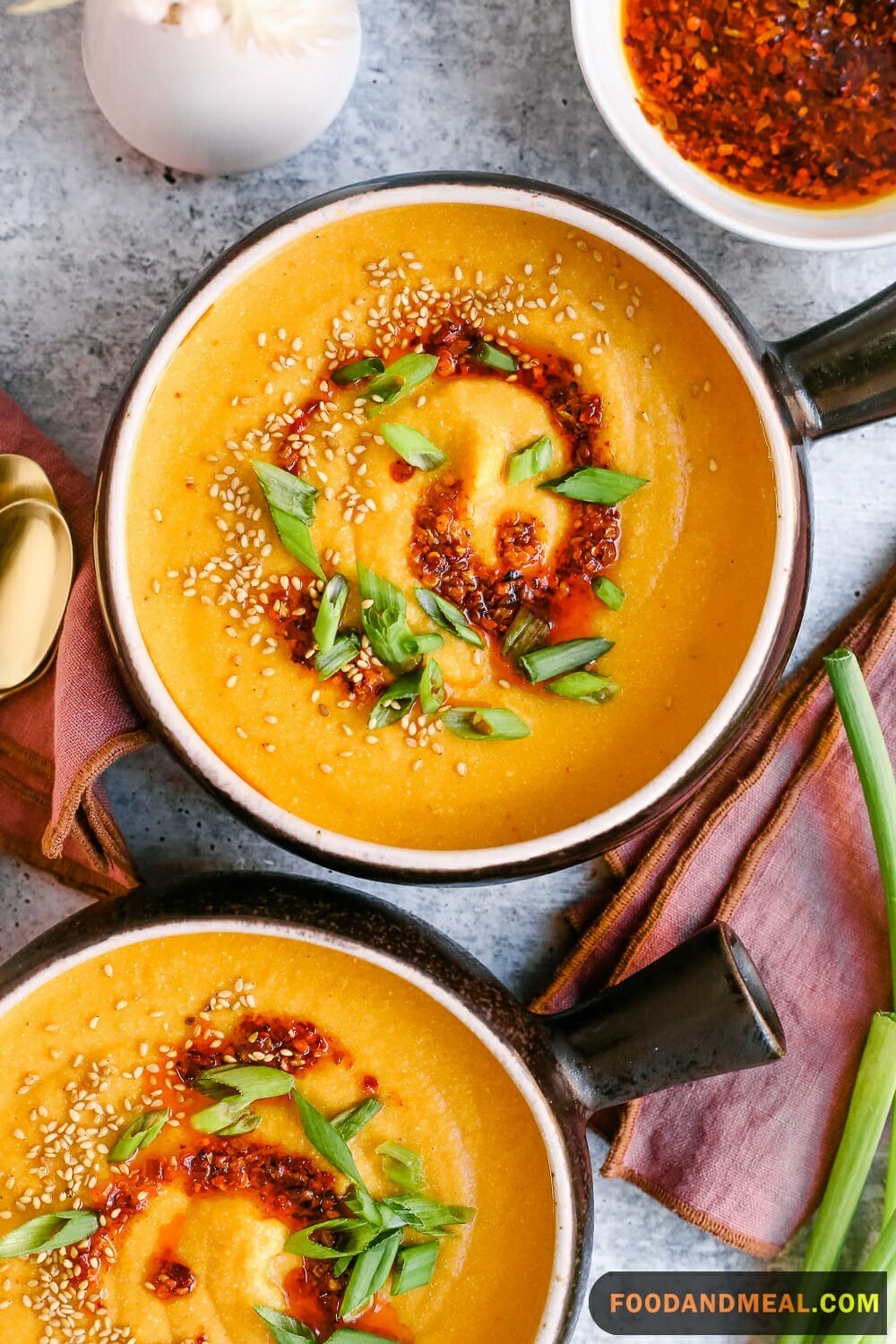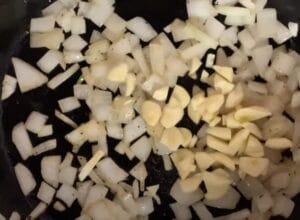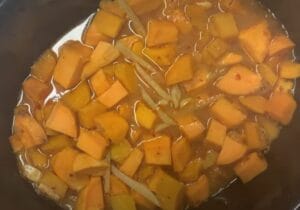As the leaves begin to turn and the air carries a crispness that whispers of autumn’s embrace, my thoughts invariably drift towards the warm, comforting flavors that define the season. I’m James Anderson, a writer at Food And Meal, where we celebrate the joy of cooking and the stories that meals can tell. Today, I find myself particularly enamored with a dish that encapsulates the essence of fall: miso butternut squash.
The butternut squash, with its smooth, beige exterior, might appear unassuming at first glance, but within lies a vibrant orange flesh that is sweet, nutty, and utterly delightful. It’s a staple in my kitchen when the weather cools, not just for its taste but also for the wealth of nutrients it brings to the table. This humble squash, when paired with the deep, savory notes of miso, transforms into a dish that is both nourishing and indulgent—a true celebration of seasonal produce.
My desire to create this dish stems from more than just an appreciation for its flavors. There’s a certain nostalgia that comes with roasting squash—the way it fills the home with a scent that’s as comforting as a well-worn sweater. And then there’s miso, a traditional Japanese seasoning that I’ve come to admire for its versatility and its ability to add a profound depth to even the simplest of dishes. The combination of these two ingredients speaks to a fusion of cultures on a plate, a testament to the beautiful complexity of modern cuisine.
In crafting this recipe, I wanted to create something that would be as visually appealing as it is delicious. The caramelized edges of the roasted squash, tinged with the golden-brown hues of the miso glaze, are a feast for the eyes. Each bite is a harmonious blend of sweetness and umami, a flavor profile that feels both exotic and familiar.
Squash Miso Recipes


Japanese Squash Miso
Equipment
Instructions
- De-seed, peel & cube butternut squash. Peel, then chop garlic and onion

- Heat oil and 1 tbsp. butter in large pot. Add garlic and onions. Fry until they are fragrant and browned lightly.

- Add cubed squash and vegetable stock. Bring to boil, then lower heat. Allow to simmer for 12-15 minutes. Squash should become quite tender.

- Meanwhile, stir 1 tbsp. miso and 1 grinding of ground pepper into softened butter in medium bowl. Beat miso into butter with fork. Cover and set aside.

- When squash is as tender as you like it, remove from heat. Ladle one scoop of hot vegetable stock into a medium bowl. Stir in other 2 tbsp. of the miso and mix well. Pour mixture back into soup. Combine by stirring.

- Mash soup a bit with a spoon to thicken it. Taste. Adjust the seasoning as preferred.

- Dish soup into individual bowls. Top with butter miso, coriander sprinkle and black pepper grinding. Serve with crusty bread.

Video
Notes
Nutrition
© Food And Meal
This website provides approximate nutrition information for convenience and as a courtesy only. Nutrition data is gathered primarily from the Spoonacular Database, whenever available, or otherwise other online calculators.
Slow Cooker Squash miso butternut squash

Once everything is in the slow cooker, set it to cook on low for 6-8 hours or on high for about 3-4 hours. The slow cooker works its magic, gently coaxing out the natural sweetness of the squash while infusing it with the savory miso and aromatics. There’s something incredibly gratifying about the slow transformation of raw ingredients into a harmonious dish with minimal effort.
Toward the end of cooking, after the squash has become tender, blending the soup directly in the slow cooker with an immersion blender creates a silky-smooth texture that feels like velvet on the tongue. If a regular blender is used instead, care should be taken when blending hot liquids, working in batches if necessary.
Adjusting seasoning is the final step—perhaps a touch of salt or a sprinkle of freshly ground black pepper. Some might appreciate a hint of acidity, maybe a squeeze of fresh lime juice, to brighten the flavors.
Tips for making Squash Miso Soup

Cooking Tips
When preparing miso butternut squash, one should approach the task with a sense of reverence for the ingredients. Butternut squash, with its vibrant orange hue, is not only a feast for the eyes but also a treasure trove of sweet, nutty flavors waiting to be unlocked. Roasting the squash is a transformative step that intensifies its natural sugars and creates a velvety texture that practically melts in your mouth. It’s a moment of pure joy when the edges caramelize to a golden-brown, and the kitchen fills with a toasty aroma that feels like a warm embrace.
Miso, on the other hand, is a testament to the wonders of fermentation. Its complex flavor profile brings depth and umami to dishes, creating a harmonious balance with the sweetness of the squash. When using miso, it’s important to remember that a little goes a long way. You want to enhance, not overpower, the inherent flavors of the squash. It’s best to whisk the miso with a bit of liquid to ensure it integrates smoothly into the dish, avoiding any unwelcome clumps that might disrupt the serene experience of savoring each bite.
One mustn’t forget the importance of seasoning. While miso does contribute a salty aspect, the right amount of salt can elevate the dish to new heights. However, it’s crucial to taste as you go, adding pinches with care, as the miso’s salinity can sneak up on you. And let’s not overlook the role of fresh herbs or a squeeze of citrus, which can add a burst of brightness that lifts the dish, making it dance on the palate.
Serving Suggestions

- Miso Soup: Starting with a miso soup can prepare the palate for the miso flavors in the main butternut squash dish.
- Sashimi: The clean, delicate flavors of sashimi can provide a nice contrast to the richness of the miso butternut squash.
- Gyoza: Offering a side of gyoza provides a textural contrast with its crispy exterior and juicy filling, making it a satisfying accompaniment.
- Rice Milk or Soy Milk: As beverages, these plant-based milks have subtle flavors that won’t overpower the main dish’s taste profile.
- Yakisoba: This stir-fried noodle dish, with its own set of vegetables and savory sauce, can stand alongside the butternut squash as part of a larger meal.
- Butajiru (Pork Miso Soup): This hearty soup has complementary flavors that echo the miso element while adding protein to the meal.
- Oyakodon: A donburi bowl like oyakodon offers a comforting balance of rice, chicken, and egg that would pair well with the sides of the miso butternut squash.
- Katsudon: Another donburi option, katsudon provides a breaded, fried cutlet for a satisfying crunch against the soft texture of the squash.
- Miso Ramen: For a more substantial pairing, miso ramen would carry forward the miso theme and contribute a variety of textures and flavors.
- Negi Oil: Drizzling negi oil over the finished squash dish could add an extra layer of flavor with its oniony, garlicky notes.
- Daifuku: Ending the meal with something sweet like daifuku, a Japanese mochi stuffed with sweet filling, balances the savory miso flavors.
FAQs about Squash Miso Soup

- Can I freeze Squash Miso Soup for later? Absolutely! Squash Miso Soup freezes well. Allow it to cool to room temperature, then transfer it to airtight containers. It will keep for up to three months. When reheating, do so gently to preserve the flavors.
- What’s the best squash variety for this soup? While butternut and kabocha are popular, acorn, or even pumpkin can work. Choose one that suits your taste. Kabocha provides a sweet and nutty flavor, while butternut has a slightly earthy taste.
- Can I make this soup in advance? Yes, it’s a great make-ahead soup. The flavors deepen when reheated. Store it in the fridge for up to 3 days and reheat on the stovetop or in the microwave.
- What do I do if my soup is too thick? If your soup turns out too thick, simply add a bit of extra vegetable broth or water while reheating until it reaches your desired consistency.
- What’s the difference between red and white miso paste? Red miso paste is fermented longer and has a stronger, deeper flavor, while white miso is milder and sweeter. Either can be used in this recipe, depending on your taste preferences.
Conclution
As the final golden leaves of autumn flutter to the ground and we prepare to welcome the embrace of winter, I reflect on the journey we’ve taken together through the flavors of the season. The miso butternut squash recipe that I’ve shared with you is more than just a dish; it’s a narrative of warmth, a symphony of taste, and a bridge between cultures.
In my kitchen, the act of peeling, dicing, and roasting the butternut squash, then watching it caramelize into a tender, golden delight has been nothing short of meditative. The miso glaze, with its complex umami character, has added not just flavor but soul to the squash, creating a dish that resonates with comfort and sophistication.
I hope that this miso butternut squash recipe has inspired you to explore the depths of autumn’s bounty and to experiment with the boldness of miso in your own culinary adventures. Whether you’ve prepared this dish for a solitary evening, savoring each bite in quiet contemplation, or presented it as the centerpiece at a gathering of friends and family, the miso butternut squash stands as a testament to the beauty of seasonal cooking.
As we bid farewell to the amber hues of fall, let us carry with us the memories of the meals we’ve shared and the new flavors we’ve discovered. May the miso butternut squash linger on your palate and in your heart as a reminder of the simple pleasures that cooking can bring into our lives.
Thank you for joining me on this gastronomic excursion. Until we meet again in the kitchen, may your days be filled with good food, laughter, and the warmth of good company. Here’s to the many recipes yet to come and the endless stories they will tell.
I'm James F Anderson, a noted sous chef from London and a Le Cordon Bleu alumnus. My career began in a Michelin-starred Parisian eatery, where my blend of classic and contemporary cooking, using seasonal ingredients, earned accolades. Recognized in culinary publications and on cooking shows, I’m committed to mentoring aspiring chefs and delivering memorable dining experiences, marking me as a standout talent in the culinary world.










